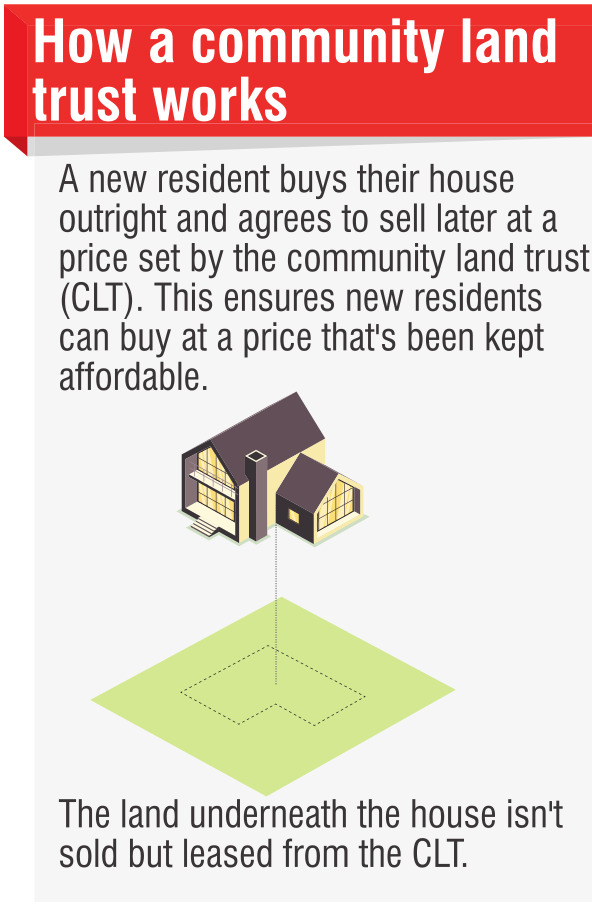
Homes that are affordable, not just for now but for every future occupier, might seem like a pipe dream.
But that’s the aim of a new Dunedin charity.
The Otepoti Futures Trust plans to use a community land trust model to provide affordable housing and associated community facilities.
Trustee Campbell McNeill said a key aspect was removing land costs from the equation for home buyers.
Typically, community land trusts acquire land and build residential units on it.
Residents can buy their homes outright but not the land on which the houses sit.
Instead, they enter into low-cost, long-term ground leases with the trust, usually for a period of 50 to 100 years.
When they leave, they can sell their home back to the trust or to another party but the resale price is capped so the house remains affordable for the next owner.
The Dunedin proposal would see the resale price restricted to the original purchase price plus inflation and the value of any improvements made to the property.
Crucially, the inflation component would be linked to the consumer price index, not to escalating land prices.
Community land trusts began in the United States and have since expanded to other countries, including New Zealand. Advocates say they can help revitalise neighbourhoods, are more resilient to fluctuations in the property market, and build community wealth and wellbeing by distributing benefits to the community rather than to developers and financiers.
In the current housing market, mortgage or rent payments often exceeded 30% of household income, which caused financial distress or made home ownership unattainable for many, Mr McNeill, who is also a director of Ahha Architects, said.

The scheme would provide healthy, efficient homes for a wider proportion of the population and that would have broader benefits, such as reducing fuel poverty and taking pressure off the health system. More affordable housing also helped the economy because homeowners had more money to spend on goods and services rather than on debt.
The trust’s geographic focus would allow it to not only address local housing needs but to provide facilities that were important to the community such as work spaces, meeting rooms or studios. There was also scope for neighbourhood energy and water schemes, as well as neighbourhood productive gardens to improve social connectedness.
While a cap on profits limited how much homeowners could build their equity, Mr McNeill said the model was designed to sit alongside the traditional housing market, not to compete with it.
At present, people were faced with high rents or high mortgages.
"This is trying to circumnavigate that by providing other options for people who prefer to be in a more safe and secure home for their family and where equity development isn’t their priority."
The Otepoti Futures Trust was formed last year, with three interim trustees to oversee its first project — a $1.5million redevelopment of the Otago Pioneer Women’s Hall in Moray Pl. The art deco building was "sold" to the trust for $1 on the condition it remain available to the community.
Income generated from that property — and others the trust acquires in the future — will help fund its developments.
Although community land trusts can buy property at going market rates, they often rely on subsidies and donations from private individuals, charities or government organisations to keep their developments affordable.
Possible sources of capital included property owned by local government, iwi and "anchor institutions" (large organisations that have a significant stake in the local area), Mr McNeill said.
It hoped to gain government housing subsidies and had already talked with private organisations about them potentially donating land. It also hoped to access "impact investments" — investments where people consider social or environmental benefits alongside financial return.
In theory, the more units they built, the lower the unit price would be.
"So it’s probably too much to suggest we’d be looking at a 100-unit development right now, but I wouldn’t suggest that’s not possible in the near future."
There were other ways to achieve economy of scale too, including using pre-defined designs across a region, buying materials at wholesale prices and prefabricating some elements to expedite the construction process.
Initially, the trust would look to provide houses for existing community housing providers who already have wait lists.
On large projects, it could also partner with private developers. For example, a large piece of land could be subdivided into "packages" owned by different entities if it helped spread infrastructure costs and get an entire development off the ground.
The next step was to develop the Pioneer Women’s Hall into a community hall, art gallery, co-working space and meeting rooms — a project that recently received resource consent and should take about 18 months, Mr McNeill said.
The trust had applied for lottery funding and planned to launch a crowdfunding campaign for the project later this year.
Once that work was complete, Mr McNeill hoped more people, including experts, stakeholders and residents, would be elected to the registered charity.
While the trust was focusing on the hall and had not yet identified any potential areas for housing, it would look at opportunities if they arose.
"Usually they come when there’s land available, and there might be some soon."
Accessing funding and land were the biggest challenges for the trust and the market in general, he added.
"And as with all property developers, we’ll have to establish feasibility on a project-by-project basis."












